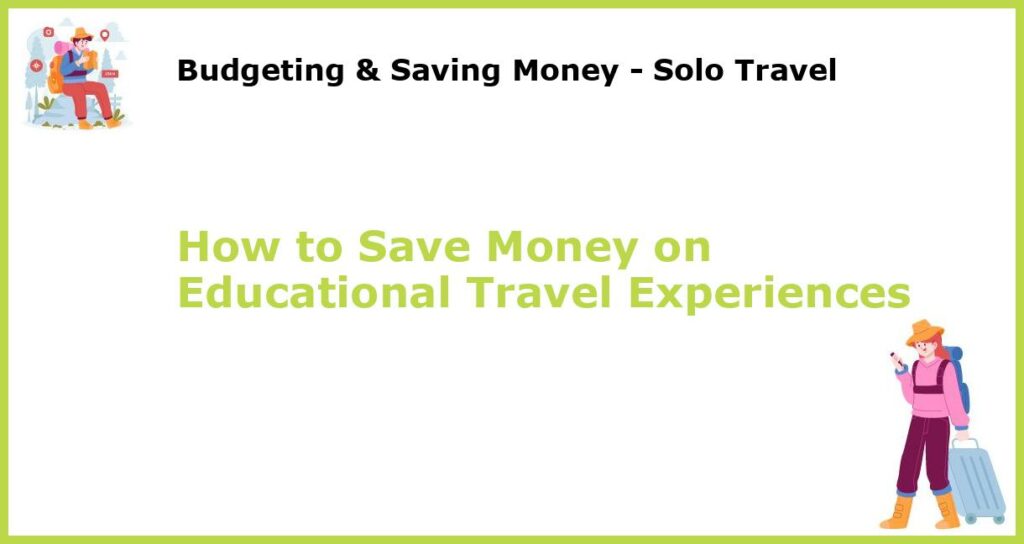Are you planning an educational travel experience but worried about the cost? Fret not, as we have compiled some tips and tricks to help you save money on your next trip. From researching your destination to taking advantage of student discounts, and everything in between, let’s dive in!
1. Research your destination thoroughly

Before booking any educational travel experience, it’s essential to research your destination in detail. Look for low-cost accommodations and activities that can help you stay within budget. It’s also a good idea to travel during the off-season when prices are lower, and crowds are thinner. Researching beforehand will give you an overview of the local culture, events, and tourist attractions that can fit your budget.
You can visit various travel blogs, forums, and social media platforms to see feedbacks or insights about your destination. While reviewing, take a look at the food scene, entertainment, transportation, accommodation, and more. For instance, you might want to know about the free concerts or festivals happening during your visit. Having a good grasp of what to expect will avoid any unnecessary spending and maximize your experience on a budget.
2. Consider alternative accommodations

Hotels can be expensive, especially in popular tourist destinations. Consider alternative accommodations, such as hostels, camping, or homestays, to save money on lodging. These options not only save money, but they also offer unique cultural experiences. Homestays, for example, connect visitors with local hosts, providing an insider’s view of their city and culture. Likewise, hosting platforms such as Airbnb invite a low-cost and homey experience rather than an expensive hotel room.
Hostels are also excellent alternatives to hotels, particularly when traveling with a group of friends. Not only are they budget-friendly, but they also offer a sense of community by allowing you to meet and interact with fellow travelers from all over the world.
3. Book in advance

Booking your travel experience in advance ensures you get the best prices on airfare, accommodations, and activities. Airlines offer discounts for early booking, while booking sites like Airbnb and Hostelworld offer lower prices for early reservations. Book early to save money and secure your spot. Last-minute bookings generally come with higher prices and fewer rooms, so always plan ahead of time.
Additionally, by booking in advance, you can create a budget tailored to your needs and wants. To maximize your savings, look for promotions and exclusive deals that can give you significant discounts.
4. Create a budget

Creating a budget before you travel is crucial to ensure that you don’t overspend. Consider all expenses, such as transportation, lodging, activities, food, and souvenirs. Once you have a budget, make sure to stick to it throughout your trip. Keep in mind that some unexpected expenses may arise, so always allocate a comfortable amount on top of the budgeted expenses.
Drawing up a budget is crucial in helping you know your limits and avoid unnecessary spending. You can use budget apps to assist you in organizing your expenses or create an excel spreadsheet to keep track of your budget. Setting realistic spending limits is vital, and practicing good spending habits will pay off in the long run.
5. Use student discounts

If you’re a student, take advantage of student discounts. Many museums, galleries, and tourist attractions offer discounts for students. Show your student ID to receive discounted rates and save money on educational travel experiences.
Additionally, some airlines and train systems offer student discounts to help you save money on transportation. Always check with museums and galleries that you want to see ahead of time to learn their rules and regulations about presenting a valid student ID.
6. Take free tours

Many cities offer free walking tours led by local guides. These tours not only provide a unique perspective on the city but are also a fantastic way to save money on educational travel experiences. Do some research before your travel to find free tours in your destination.
Besides free walking tours, some cities offer free bike tours, scenic walks, and even free museum entry if you visit at certain times. Utilize the city’s free tour options to see popular landmarks and learn about the city’s culture and history.
7. Eat like a local
Avoid eating at tourist spots, which can be expensive. Instead, eat like a local and try street food and local restaurants. Not only will you save money, but you’ll also get to experience the local culture and cuisine.
Before your trip, do some research on the local food scene and find out where most locals eat. Sample different street foods, regional specialties, and home-cooked meals and save your fine dining for special occasions. Additionally, avoid tourist traps where the price is often inflated, and the quality may not meet expectations.
8. Use public transportation
Instead of taking cabs or private transportation, use public transportation such as buses, trains, and subways. Public transportation can be an excellent budget-friendly alternative, and it also gives you a chance to experience the city like a local.
Public transportation is easy to navigate in most cities, and with the availability of maps and apps, it’s effortless. Taking the local commute can help you avoid excessive taxi fares, and you will be able to experience the city from a different perspective. However, always prioritize your safety, especially at late hours, and transact with authorized personnel only.
9. Look for free activities
Many museums, galleries, and tourist attractions offer free admission days or hours. Do some research before you travel to find free activities in your destination. You can also check out local events calendars for free concerts, festivals, and other cultural events.
Many larger cities have monthly, weekly, or even daily free attractions for the public. From admiring art in museums to enjoying evening strolls in the park, there are several opportunities to save and explore. Take note that the free activities offered may depend on the season or certain occasions, so always plan your itinerary ahead.
10. Travel with a group
Travelling with a group can help you save money on educational travel experiences. Share accommodations, meals, and activities with your travel companions to keep costs down. Group discounts are also available for many tours and activities.
Traveling with a group can help minimize expenses, especially if you are splitting accommodations, transportation or meals. Group tours offer the best deals and can help you maximize your expenses based on your itinerary. Additionally, joining group tours can provide an opportunity for you in meeting new people and gaining new perspectives on different cultures.








 You might also be interested in those articles related to solo traveling
You might also be interested in those articles related to solo traveling